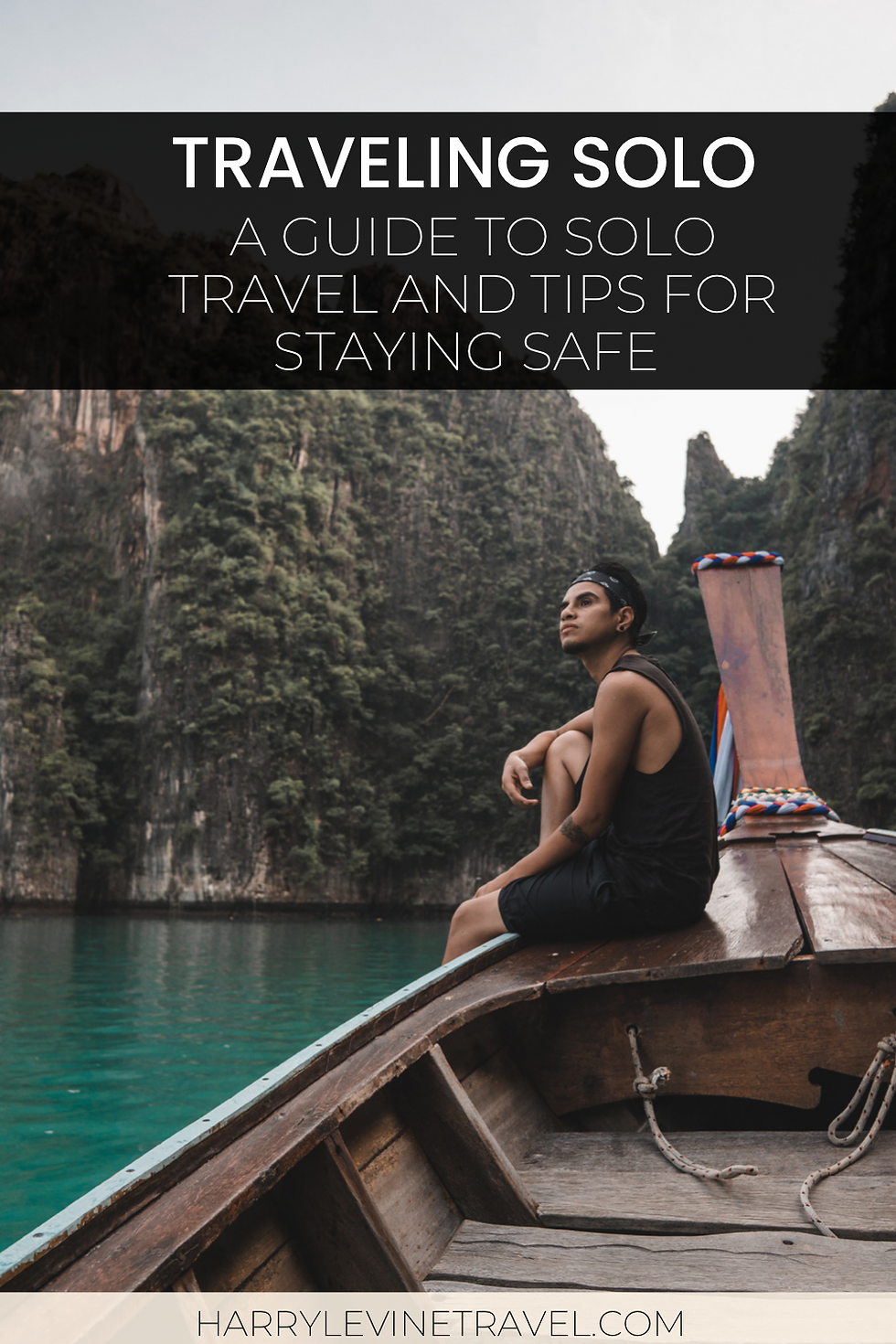Traveling Solo: A Guide To Solo Travel And Tips For Staying Safe
- harry levine

- Jan 14, 2023
- 3 min read
Are you planning a solo travel adventure? Whether you're a seasoned solo traveler or a first-timer, this guide is for you. In "Traveling Solo: A Guide To Solo Travel And Tips For Staying Safe", we provide you with all the tips and tricks you need to prepare, explore and stay safe while traveling alone. From researching your destination and making copies of important documents, to blending in with local culture and staying informed about local news and weather conditions, this guide covers it all. Learn how to trust your instincts, stay in touch with loved ones and have a plan for emergencies. So, pack your bags, and get ready to navigate the world alone with confidence!

1. Research your destination thoroughly before you go. This includes understanding the local laws and customs, as well as any potential safety hazards. Make sure to read reviews and gather information from reliable sources such as government travel websites, tour operators and local expats blogs. Be aware of any current events or security alerts that may be happening in your destination.
2. Make copies of important documents, such as your passport and ID, and leave them with a trusted friend or family member. This will make it easier for you to replace lost or stolen documents. It's also a good idea to take a photograph of your passport, driver's license, and credit cards and email it to yourself or save it on a cloud-based service.
3. Inform someone of your travel plans, including your itinerary and contact information. Let a friend or family member know your travel itinerary, including flight numbers, accommodation details, and contact information. Make sure they know how to reach you in case of emergency.
4. Be aware of your surroundings at all times and trust your instincts. If a situation or location feels unsafe, leave immediately. Pay attention to your surroundings, and if you feel threatened or uncomfortable, leave the area immediately.
5. Dress modestly and blend in with the local culture to avoid drawing unwanted attention. Dress in a way that is respectful of the local culture, and avoid wearing clothing or jewelry that would make you stand out as a tourist.
6. Avoid carrying large amounts of cash and valuables, and use a money belt or hidden pouch to keep your belongings safe. Keep your cash and credit cards in different places on your person, so that if one is lost or stolen, you will still have access to funds.
7. Be cautious when using ATMs and be aware of your surroundings when withdrawing money. Use ATMs located in well-lit and populated areas, and be aware of anyone who may be watching you or following you after you have withdrawn money.
8. Learn a few basic phrases in the local language to communicate your needs and ask for help if needed. Knowing basic phrases such as "Please," "Thank you," "Where is the nearest police station," and "I need help" can be very helpful in case you need assistance.
9. Avoid walking alone at night and in unfamiliar areas. It's best to stick to well-lit and populated areas, especially when it's dark outside.
10. Always know the location of the nearest embassy or consulate. In case of an emergency, it's important to know the location of the nearest embassy or consulate, and to have the contact information for them with you at all times.
11. Have a plan for emergencies and know the emergency contact numbers for your destination. Make sure you have emergency contact numbers such as the local police, ambulance, and fire department, as well as the contact information for your hotel or hostel, and for your travel insurance company.
12. Avoid posting your travel plans on social media until you have returned home safely. Posting your travel plans on social media can make you a target for crime and can also alert potential thieves that your home may be empty.
13. Take a travel insurance. Make sure you have travel insurance before you go, so that you are covered in case of emergency or unexpected events.
14. Stay in touch with your friends and family back home. Let them know you are safe and well, and keep them updated on your plans and whereabouts.
15. Stay informed about the local news and weather conditions. Keep an eye on local news and weather forecasts, so you can be prepared for any potential hazards or disruptions.
In conclusion, solo travel can be a wonderful and rewarding experience, but it's important to take the necessary precautions to ensure your safety. By researching your destination beforehand, making copies of important documents, informing someone of your plans, being aware of your surroundings, and following the tips outlined in this guide, you can greatly reduce the risk of danger and have a safe and enjoyable solo travel experience. Remember to stay informed about local news and weather conditions, stay in touch with friends and family, and always trust your instincts. Happy and safe travels!







Kommentare